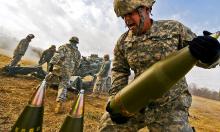John Bourke: President Wesley Clarke?
Next month, November will see a year long run up to the next Presidential race in the US and that isn't a very long time for a campaign as important as this
A bulging field of nine candidates is standing amongst the Democratic Party, all lining up in what will probably be the difficult and unenviable task of defeating incumbent George W. Bush.
Into this field arrived the new contender recently in the shape of retired NATO General Commander Wesley Clarke and, no sooner then he had done so than several polls were showing him leading the field almost immediately.
Whilst the desire for Democrats to put forward a candidate good enough to win the 2004 Presidential race is understandable, the manner in which all of this seems to have come about with Wesley Clarke does seem to pose some uncomfortable questions here for a party desperate to regain power once again.
From a policy perspective, one has to ponder the wisdom of choosing a retired army general to challenge George W. Bush primarily because he is just that - a retired army general. In doing so, the clear danger is that Democrats effectively surrender the moral high ground here by conceding that the presidential campaign will be fought on essentially one issue above all, that one issue being arguably the incumbent's greatest strength anyway - national security and the fight against terrorism.
Yet Wesley Clarke's only apparent justification for his credibility as opposed to George W. Bush’s will be that he wore a military uniform once.
Is that to be the solitary raison d’etre for why Democrats expect the American electorate to eject their popular war time president from power? It seems a fragile reason on it's own if that is what they are hoping for. Unless we assume that the electorate are not very bright then there is every chance in the world that at some point it may well occur to voters that just because he was a general that does not necessarily qualify him to have all the answers to anything, and all the more so where there are conflicting reports out there about the quality and effectiveness of his time in military leadership anyway.
All of this does not even take into account the fact that combating terrorism is rarely ever successful ultimately when dealt with in a military manner alone and if that is where Wesley Clarke's main credentials lie then he is possibly quite ill equipped to handle that critical issue at all.
How ironic then that the very same Democratic Party which decries the Bush administration for not being skillful enough in the diplomatic arena at the UN should then turn to a military man as their front runner.
Notwithstanding these concerns, it raises questions even on a practical level because it smacks of desperation and crass political opportunism to wheel out such a candidate at the last moment who has no track record of participation in any form of politics or, indeed, for the very political party that he now suddenly chooses to ask to be allowed to represent.
We have already only just recently witnessed an unsavoury example of that with the election of Arnold Schwarzenegger as Governor in California. In opposing him, Democrats complained (rightly so as it happens) that he was not a real conservative Republican and had never actually explained what his policies were to the voters. Are we now going to witness the hypocrisy of them doing the same thing themselves simple for a shot at winning irrespective of whether the candidate is genuinely qualified or not?
At the end of the day, the other front runner in Howard Dean may or may not be the best candidate to take on George W. Bush in November 2004. Only time will tell. Conservative Republican cynics say that they would relish the chance to fight him electorally as they are so convinced that his liberal agenda will backfire disasterously just as it did for the Democrats with George McGovern in 1972 against Richard Nixon.
These indeed may well be valid concerns for Democratic activists to consider on choosing their presidential candidate. It is indeed true to say that unless one gets into power in the first place then there is little chance of any changes happening.
However, it is also a truism that there is little point in getting elected only to then have to reveal to the public that you have nothing more to offer them than the last guy in there whom you just beat.
John Bourke is a writer and veteran Public Relations consultant who has worked with the media in both the UK and US for the last 20 years. He is a Contributing Editor to PRAVDA.Ru.
Subscribe to Pravda.Ru Telegram channel, Facebook, RSS!




